
Kensy Cooperrider
@kensycoop.bsky.social
Cognitive scientist, writer, podcaster. Interested in the diversity of communication & cognition. Language, gesture, concepts, time, space, metaphor.
Host of Many Minds (@manymindspod.bsky.social)
www.kensycooperrider.com
Host of Many Minds (@manymindspod.bsky.social)
www.kensycooperrider.com
Pinned
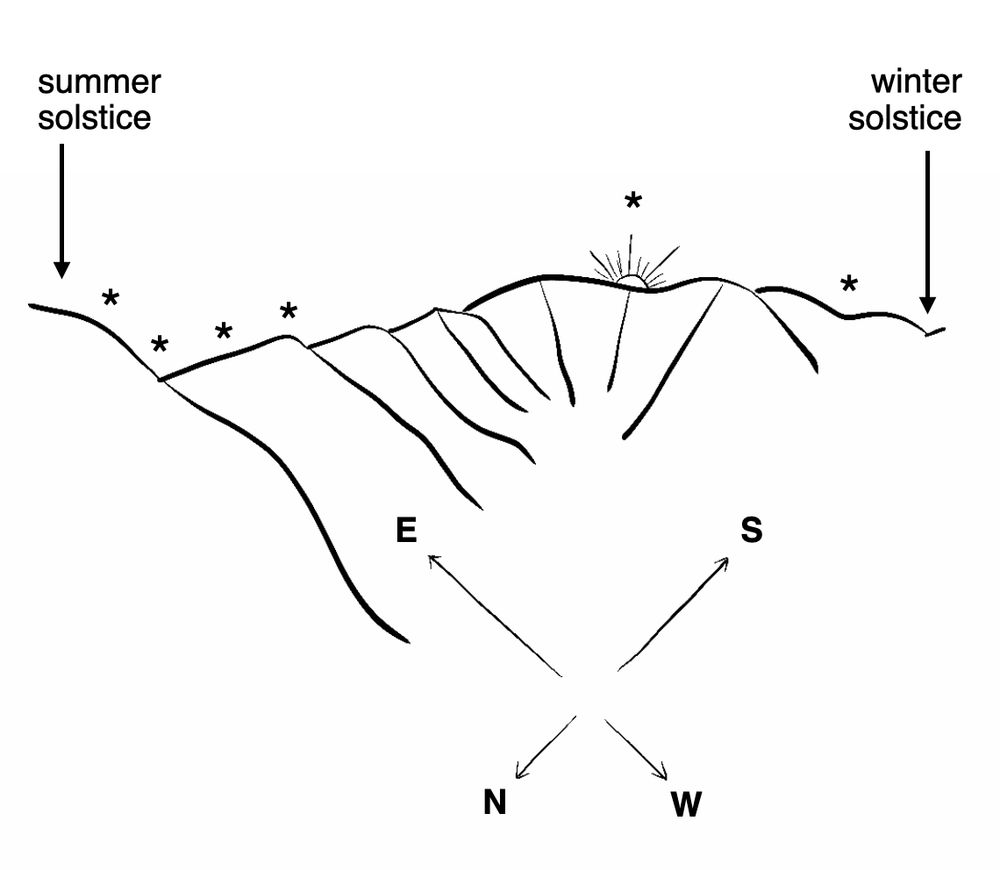
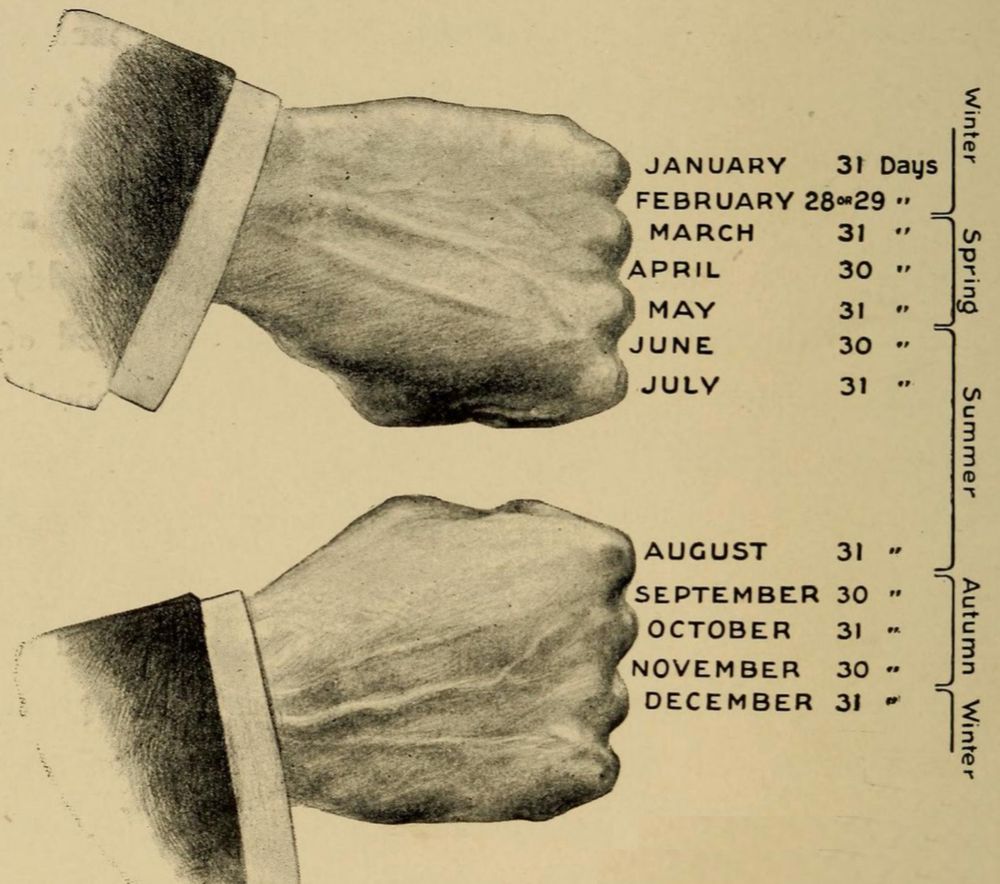
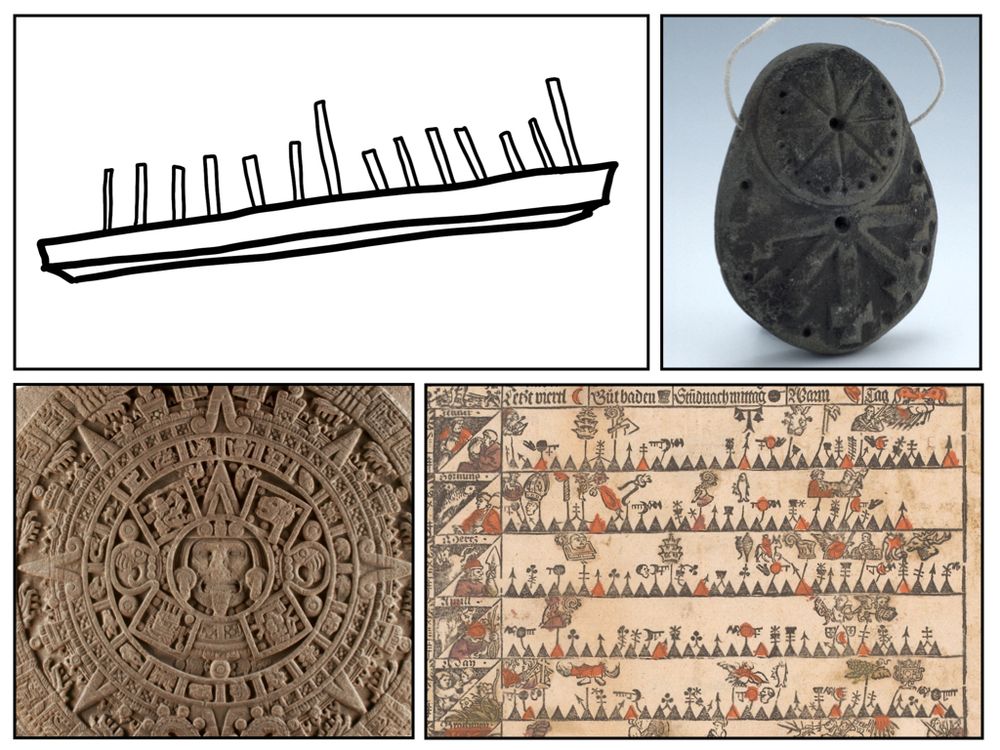
How are humans able to make sense of time? Not with special biology but with “time tools”—ideas, practices, and artifacts that render time more concrete.
My new paper explores this vast, varied toolkit—one that makes use of knots, nuts, hands, flowers, mountains, shadows, and much more.
(link 👇)
My new paper explores this vast, varied toolkit—one that makes use of knots, nuts, hands, flowers, mountains, shadows, and much more.
(link 👇)
Reposted by Kensy Cooperrider
Natalie Lawrence (ENCHANTED CREATURES) and I (HUMANS: A MONSTROUS HISTORY) were interviewed by @kensycoop.bsky.social on the @manymindspod.bsky.social #podcast! Some monster-making egs we explored:
1/
💙📚 🧪🗃 #ancient #medieval #earlymodern #histsci #histmed #18thCentury #politics #psychology #HAMH 🧵
1/
💙📚 🧪🗃 #ancient #medieval #earlymodern #histsci #histmed #18thCentury #politics #psychology #HAMH 🧵

Monsters and their makers - DISI
Exploring our world's diverse forms of mind—human, animal, machine—from diverse perspectives.
disi.org
October 25, 2025 at 5:06 PM
Natalie Lawrence (ENCHANTED CREATURES) and I (HUMANS: A MONSTROUS HISTORY) were interviewed by @kensycoop.bsky.social on the @manymindspod.bsky.social #podcast! Some monster-making egs we explored:
1/
💙📚 🧪🗃 #ancient #medieval #earlymodern #histsci #histmed #18thCentury #politics #psychology #HAMH 🧵
1/
💙📚 🧪🗃 #ancient #medieval #earlymodern #histsci #histmed #18thCentury #politics #psychology #HAMH 🧵
My reaction to social AI had always been one of dismay, disgust, fatalism, maybe even grief for our species.
I won't say this conversation left me feeling optimistic, exactly, but it certainly broadened my imagination.
I won't say this conversation left me feeling optimistic, exactly, but it certainly broadened my imagination.
New episode!! 🎙️🎉
A conversation with Dr. Henry Shevlin about the emerging world of "social AI."
Digital lovers. AI coaches and tutors. Griefbots and artificial friends. What will this mean for our relationships, our social skills, and our society as a whole?
Listen: disi.org/the-age-of-s...
A conversation with Dr. Henry Shevlin about the emerging world of "social AI."
Digital lovers. AI coaches and tutors. Griefbots and artificial friends. What will this mean for our relationships, our social skills, and our society as a whole?
Listen: disi.org/the-age-of-s...

October 10, 2025 at 6:47 PM
My reaction to social AI had always been one of dismay, disgust, fatalism, maybe even grief for our species.
I won't say this conversation left me feeling optimistic, exactly, but it certainly broadened my imagination.
I won't say this conversation left me feeling optimistic, exactly, but it certainly broadened my imagination.
A fun one! In which we discuss...
- the deep evolutionary history of birds
- sci-fi-sounding structures in bird brains
- the perennial puzzle of magnetoreception
- seasonal changes in bird (and some mammal) brains
- unihemispheric sleep
- gynandromophry
- the extractive foraging hypothesis
etc.!
- the deep evolutionary history of birds
- sci-fi-sounding structures in bird brains
- the perennial puzzle of magnetoreception
- seasonal changes in bird (and some mammal) brains
- unihemispheric sleep
- gynandromophry
- the extractive foraging hypothesis
etc.!
Bird brains aren't the same as mammal brains. They took their own twisty evolutionary path. So what can they teach us about brains in general?
A lot, it turns out.
Just one of the topics discussed in our latest episode, w/ @evoneuro.bsky.social & Georg Striedter!
Listen: disi.org/brains-of-a-...
A lot, it turns out.
Just one of the topics discussed in our latest episode, w/ @evoneuro.bsky.social & Georg Striedter!
Listen: disi.org/brains-of-a-...

October 2, 2025 at 5:55 PM
A fun one! In which we discuss...
- the deep evolutionary history of birds
- sci-fi-sounding structures in bird brains
- the perennial puzzle of magnetoreception
- seasonal changes in bird (and some mammal) brains
- unihemispheric sleep
- gynandromophry
- the extractive foraging hypothesis
etc.!
- the deep evolutionary history of birds
- sci-fi-sounding structures in bird brains
- the perennial puzzle of magnetoreception
- seasonal changes in bird (and some mammal) brains
- unihemispheric sleep
- gynandromophry
- the extractive foraging hypothesis
etc.!
This was as good as I hoped—surprised I haven't been hearing more buzz about it!

October 1, 2025 at 5:50 PM
This was as good as I hoped—surprised I haven't been hearing more buzz about it!
Reposted by Kensy Cooperrider
Why do we smile?
What makes pulling back the lip corners a fundamentally positive act? Why don’t we beam out good vibes by blinking our eyes or wrinkling our noses?
From our archive, @kensycoop.bsky.social's essay about the (murky) origins of the smile: disi.org/dawn-of-the-...
What makes pulling back the lip corners a fundamentally positive act? Why don’t we beam out good vibes by blinking our eyes or wrinkling our noses?
From our archive, @kensycoop.bsky.social's essay about the (murky) origins of the smile: disi.org/dawn-of-the-...

September 22, 2025 at 4:47 PM
Why do we smile?
What makes pulling back the lip corners a fundamentally positive act? Why don’t we beam out good vibes by blinking our eyes or wrinkling our noses?
From our archive, @kensycoop.bsky.social's essay about the (murky) origins of the smile: disi.org/dawn-of-the-...
What makes pulling back the lip corners a fundamentally positive act? Why don’t we beam out good vibes by blinking our eyes or wrinkling our noses?
From our archive, @kensycoop.bsky.social's essay about the (murky) origins of the smile: disi.org/dawn-of-the-...
Super fun having @manvir.bsky.social on the podcast (again)!
I strongly recommend his new book—especially if you like your non-fiction laced with personal narrative, quirky characters, & history of ideas.
I strongly recommend his new book—especially if you like your non-fiction laced with personal narrative, quirky characters, & history of ideas.
We often treat religion and shamanism as fundamentally different. But the two are deeply enmeshed, and a push and pull between them has played out repeatedly across history.
Just one of the topics discussed in latest episode, with @manvir.bsky.social!
Listen: disi.org/the-shaman-w...
Just one of the topics discussed in latest episode, with @manvir.bsky.social!
Listen: disi.org/the-shaman-w...
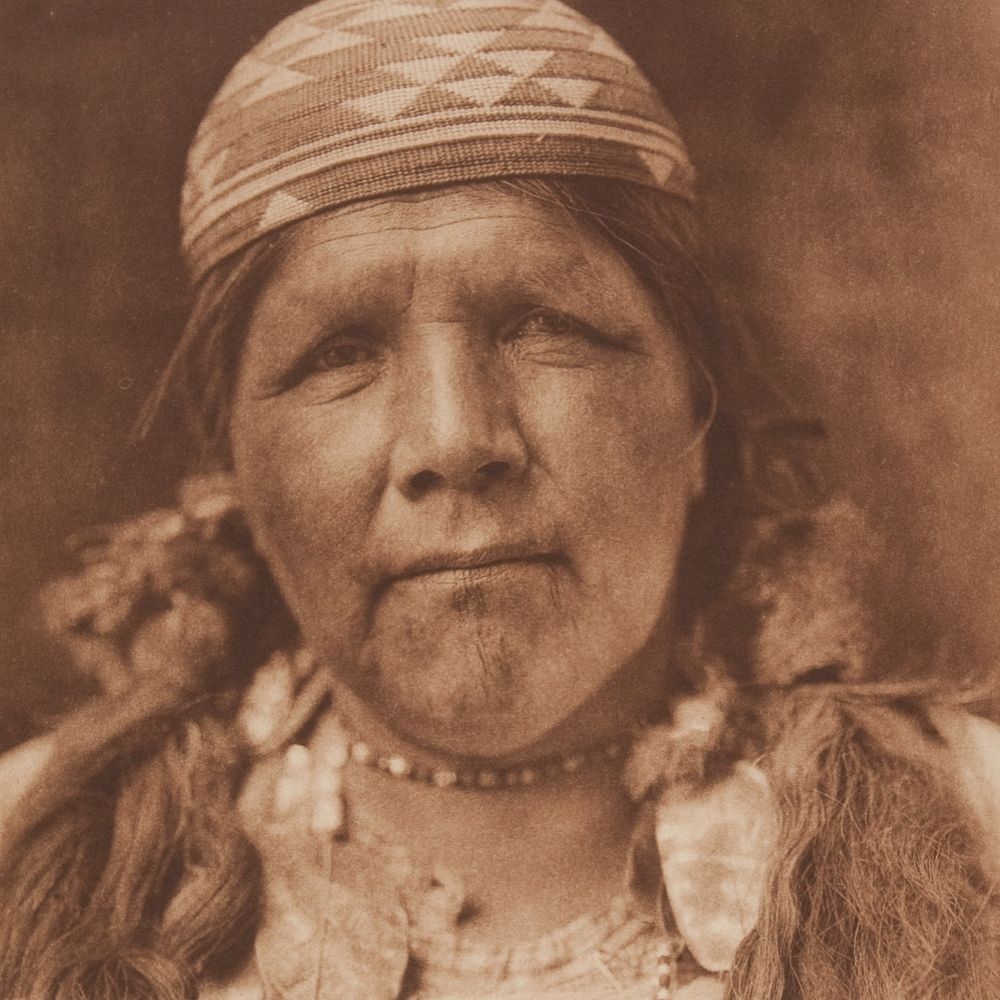
August 7, 2025 at 5:44 PM
Super fun having @manvir.bsky.social on the podcast (again)!
I strongly recommend his new book—especially if you like your non-fiction laced with personal narrative, quirky characters, & history of ideas.
I strongly recommend his new book—especially if you like your non-fiction laced with personal narrative, quirky characters, & history of ideas.
Reposted by Kensy Cooperrider
Thank you, @kensycoop.bsky.social, for having me on! We had a great conversation about shamanism—its cognitive foundations, place in Paleolithic societies, role in Abrahamic religions, manifestations in industrialized societies (including hedge wizards), and much more.
New episode!! 🎙️📣
A conversation with @manvir.bsky.social about the many faces of shamanism.
Shamanism is not a relic of the past or a curio from far-off lands—it's alive and well, all around the world. The roots of shamanism, after all, lie within us.
Listen: disi.org/the-shaman-w...
A conversation with @manvir.bsky.social about the many faces of shamanism.
Shamanism is not a relic of the past or a curio from far-off lands—it's alive and well, all around the world. The roots of shamanism, after all, lie within us.
Listen: disi.org/the-shaman-w...

August 1, 2025 at 4:50 PM
Thank you, @kensycoop.bsky.social, for having me on! We had a great conversation about shamanism—its cognitive foundations, place in Paleolithic societies, role in Abrahamic religions, manifestations in industrialized societies (including hedge wizards), and much more.
Reposted by Kensy Cooperrider
A fascinating podcast with Sheina Lew-Levy and Dorsa Amir about childhood across cultures, very insightful ideas about how contemporary Western parents could learn from forager childhoods, especially the importance of peer culture (read the Opies!).
podcasts.apple.com/us/podcast/v...
podcasts.apple.com/us/podcast/v...
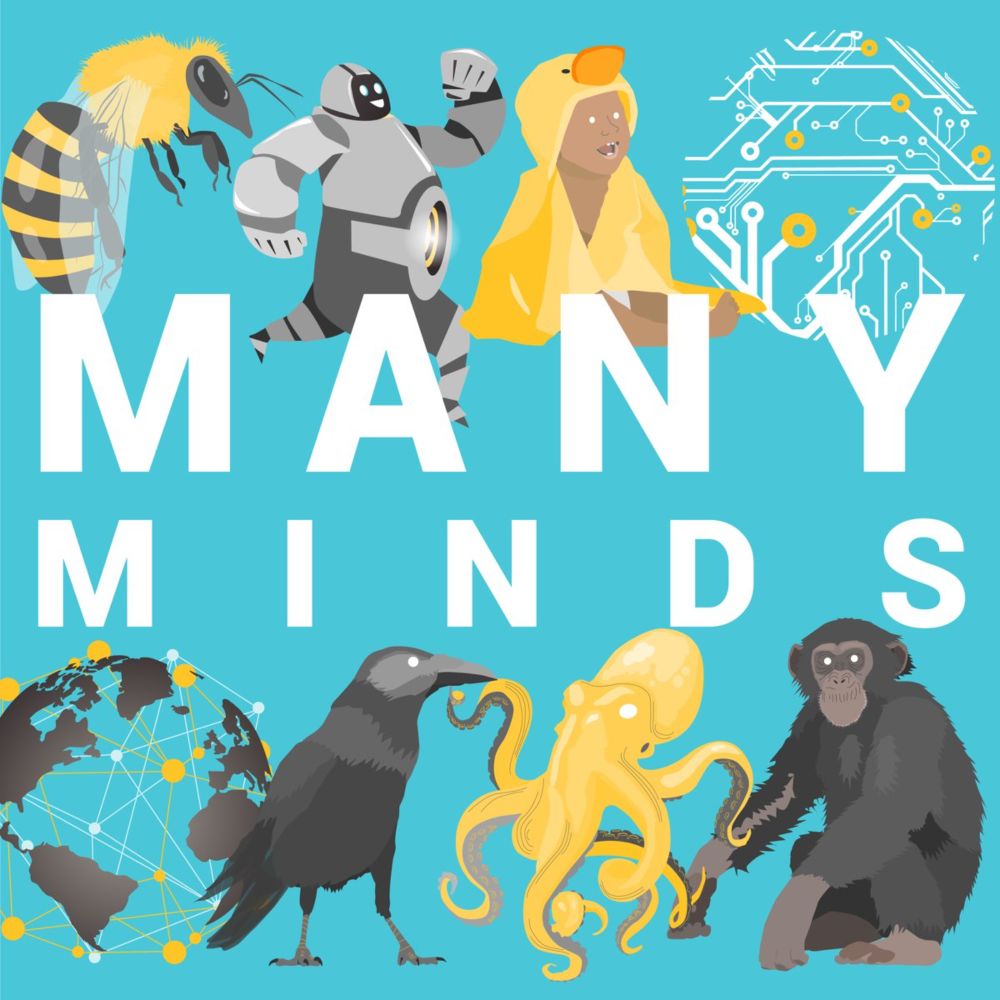
Varieties of childhood
Podcast Episode · Many Minds · 07/10/2025 · 1h 29m
podcasts.apple.com
July 20, 2025 at 7:24 PM
A fascinating podcast with Sheina Lew-Levy and Dorsa Amir about childhood across cultures, very insightful ideas about how contemporary Western parents could learn from forager childhoods, especially the importance of peer culture (read the Opies!).
podcasts.apple.com/us/podcast/v...
podcasts.apple.com/us/podcast/v...
Reposted by Kensy Cooperrider
This was such a fun conversation about childhood, play, and agency across cultures. Thanks for having @sheinalew.bsky.social & I on the show!
New episode!! 🎙️📣
A chat w/ @sheinalew.bsky.social & @dorsaamir.bsky.social about childhood across cultures.
Humans everywhere go through childhood—a time of learning, growth, and play. But this universal stage of life can look very different in different places.
Listen: disi.org/varieties-of...
A chat w/ @sheinalew.bsky.social & @dorsaamir.bsky.social about childhood across cultures.
Humans everywhere go through childhood—a time of learning, growth, and play. But this universal stage of life can look very different in different places.
Listen: disi.org/varieties-of...

July 19, 2025 at 1:50 PM
This was such a fun conversation about childhood, play, and agency across cultures. Thanks for having @sheinalew.bsky.social & I on the show!
Reposted by Kensy Cooperrider
This was such a fun conversation - grateful for Kensy's excellent questions and a space to share my ongoing project with @lmesseri.bsky.social!
New episode!! 🎙️🎙️
A conversation w/ @mjcrockett.bsky.social about AI and science!
We're in the midst of a major transformation, with AI reshaping the entire research pipeline. These changes may well boost scientific productivity. Will they also boost understanding?
Listen: disi.org/science-ai-a...
A conversation w/ @mjcrockett.bsky.social about AI and science!
We're in the midst of a major transformation, with AI reshaping the entire research pipeline. These changes may well boost scientific productivity. Will they also boost understanding?
Listen: disi.org/science-ai-a...

July 10, 2025 at 1:59 PM
This was such a fun conversation - grateful for Kensy's excellent questions and a space to share my ongoing project with @lmesseri.bsky.social!
In which we discuss...
- the Big Five and other "Big Few" models
- the Myer's Briggs
- how personality reliably changes with age
- how personality *doesn't* really change with life events
- the (putative) biological basis of personality
- how personality varies by gender, birth order (?), occupation
- the Big Five and other "Big Few" models
- the Myer's Briggs
- how personality reliably changes with age
- how personality *doesn't* really change with life events
- the (putative) biological basis of personality
- how personality varies by gender, birth order (?), occupation
New episode!! 📣🎙️
A conversation w/ @renemottus.bsky.social about the science of human personality.
The "Big Five" model of human personality has been enormously generative and influential. But what does it miss? What does it mask? Where should the field go next?
Listen: disi.org/the-big-five...
A conversation w/ @renemottus.bsky.social about the science of human personality.
The "Big Five" model of human personality has been enormously generative and influential. But what does it miss? What does it mask? Where should the field go next?
Listen: disi.org/the-big-five...
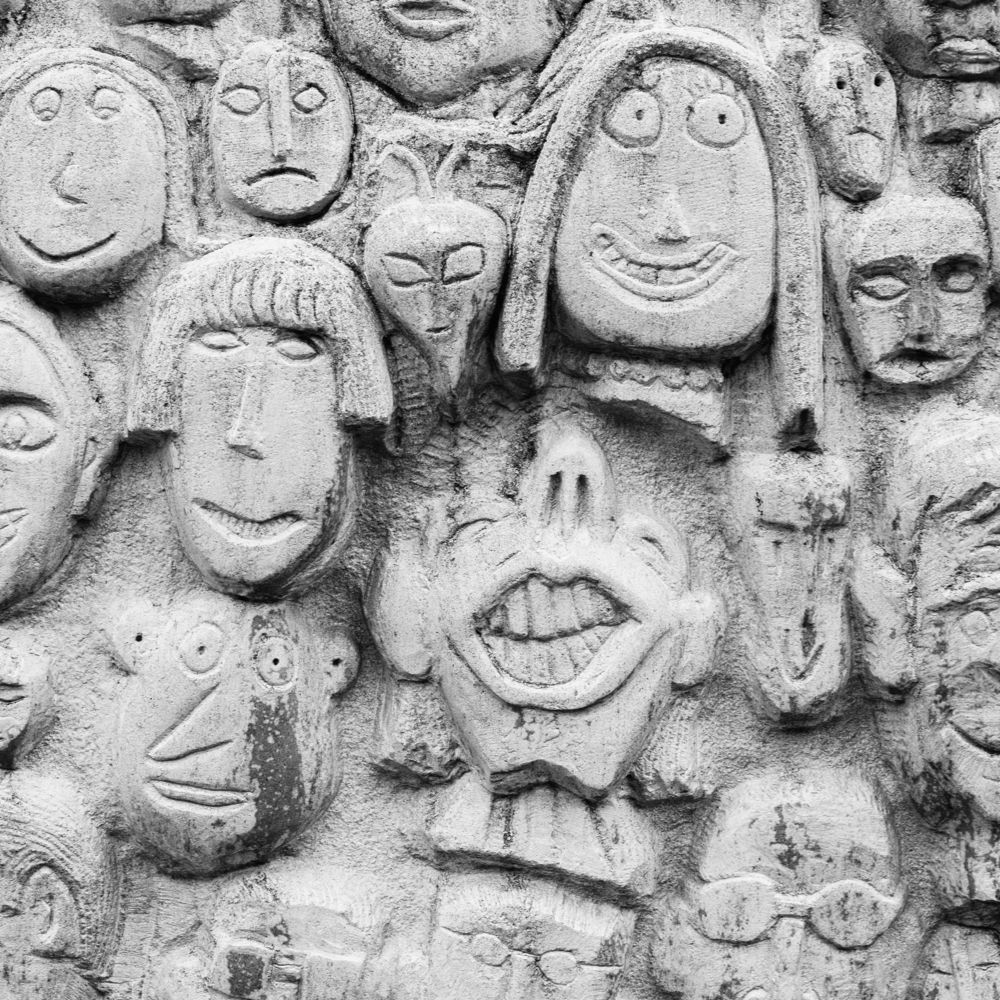
June 3, 2025 at 6:36 PM
In which we discuss...
- the Big Five and other "Big Few" models
- the Myer's Briggs
- how personality reliably changes with age
- how personality *doesn't* really change with life events
- the (putative) biological basis of personality
- how personality varies by gender, birth order (?), occupation
- the Big Five and other "Big Few" models
- the Myer's Briggs
- how personality reliably changes with age
- how personality *doesn't* really change with life events
- the (putative) biological basis of personality
- how personality varies by gender, birth order (?), occupation
More colorful example of a coordination device: the Jivaro "banana clock."
Every guest invited to a feast gets a green banana from the same stalk. When the bananas are just about ripe, the guests know the event is due.
(hat tip to William Buckner; reported in Harner, 1973)
Every guest invited to a feast gets a green banana from the same stalk. When the bananas are just about ripe, the guests know the event is due.
(hat tip to William Buckner; reported in Harner, 1973)
3/
A related practice was to create coordination devices. You distributed copies of simple artifact with identical numbers of markers (knots, pegs, etc.) to people attending a future event. Everyone removes one marker each morning; the event is due to occur on the day the last marker is removed.
A related practice was to create coordination devices. You distributed copies of simple artifact with identical numbers of markers (knots, pegs, etc.) to people attending a future event. Everyone removes one marker each morning; the event is due to occur on the day the last marker is removed.
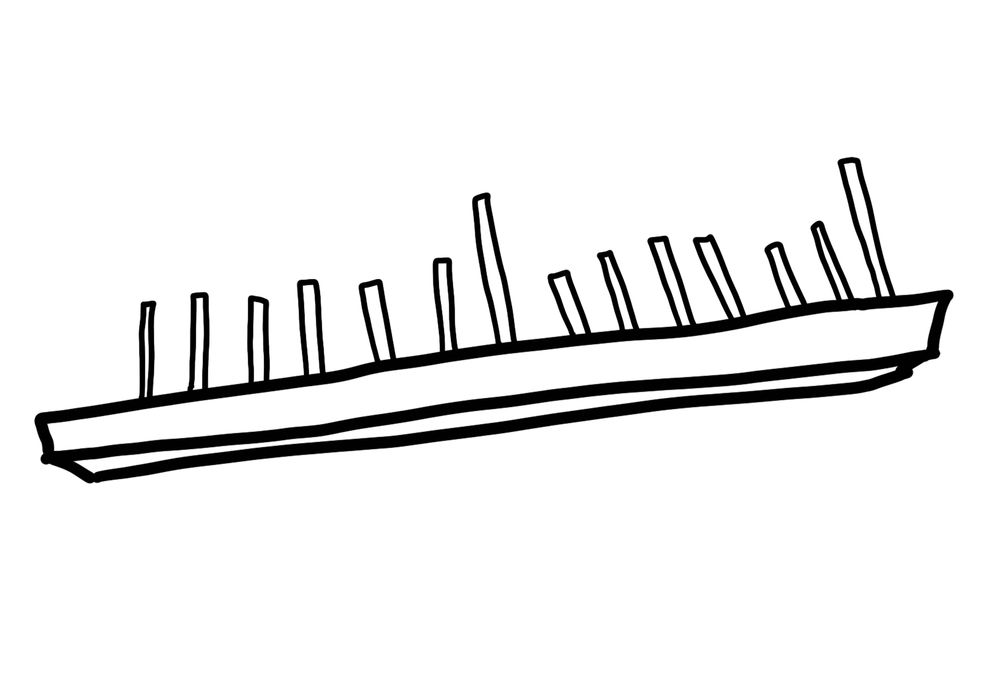
May 21, 2025 at 4:15 PM
More colorful example of a coordination device: the Jivaro "banana clock."
Every guest invited to a feast gets a green banana from the same stalk. When the bananas are just about ripe, the guests know the event is due.
(hat tip to William Buckner; reported in Harner, 1973)
Every guest invited to a feast gets a green banana from the same stalk. When the bananas are just about ripe, the guests know the event is due.
(hat tip to William Buckner; reported in Harner, 1973)
Lots in this one! We touch on:
- ontological shock
- mysticism
- "comforting delusions"
- "unselfing"
- microdosing
- placebo effects & adverse effects
- physicalism and idealism
- belief change
- environmental virtues
- meditation
- psychedelics as "agents of moral enhancement"
- ontological shock
- mysticism
- "comforting delusions"
- "unselfing"
- microdosing
- placebo effects & adverse effects
- physicalism and idealism
- belief change
- environmental virtues
- meditation
- psychedelics as "agents of moral enhancement"
New episode!! 🎙️
A conversation w/ Dr. Chris Letheby about the philosophy of psychedelics.
Psychedelics open up new questions—questions about the mind, belief, the self, moral enhancement, and the ethics of transformative experience. Philosophers have taken note.
Listen: disi.org/philosophers...
A conversation w/ Dr. Chris Letheby about the philosophy of psychedelics.
Psychedelics open up new questions—questions about the mind, belief, the self, moral enhancement, and the ethics of transformative experience. Philosophers have taken note.
Listen: disi.org/philosophers...
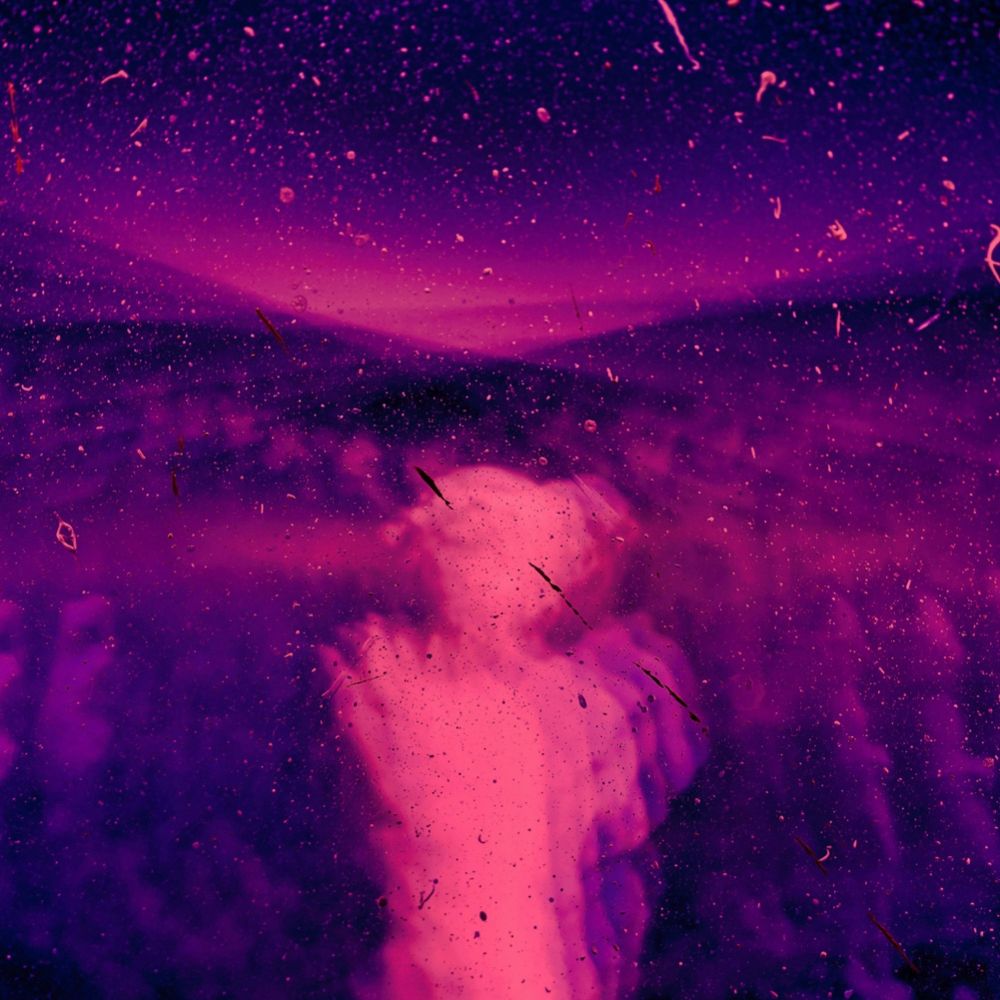
May 20, 2025 at 5:43 PM
Lots in this one! We touch on:
- ontological shock
- mysticism
- "comforting delusions"
- "unselfing"
- microdosing
- placebo effects & adverse effects
- physicalism and idealism
- belief change
- environmental virtues
- meditation
- psychedelics as "agents of moral enhancement"
- ontological shock
- mysticism
- "comforting delusions"
- "unselfing"
- microdosing
- placebo effects & adverse effects
- physicalism and idealism
- belief change
- environmental virtues
- meditation
- psychedelics as "agents of moral enhancement"
Reposted by Kensy Cooperrider
“Handy Mnemonics: The Five-Fingered Memory Machine” — @kensycoop explores the history of storing knowledge on the surface of fingers and palms: https://publicdomainreview.org/essay/handy-mnemonics
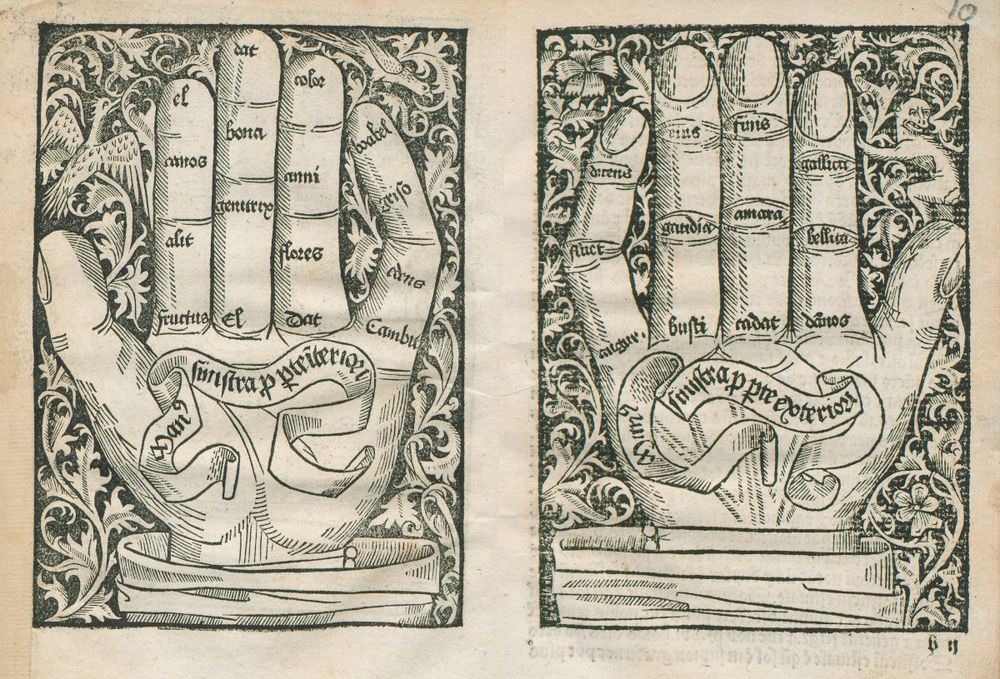
May 13, 2025 at 4:48 PM
“Handy Mnemonics: The Five-Fingered Memory Machine” — @kensycoop explores the history of storing knowledge on the surface of fingers and palms: https://publicdomainreview.org/essay/handy-mnemonics
A few highlights from my "time tools" paper in 🧵 below.
First, up "mountain calendars"...
First, up "mountain calendars"...
How are humans able to make sense of time? Not with special biology but with “time tools”—ideas, practices, and artifacts that render time more concrete.
My new paper explores this vast, varied toolkit—one that makes use of knots, nuts, hands, flowers, mountains, shadows, and much more.
(link 👇)
My new paper explores this vast, varied toolkit—one that makes use of knots, nuts, hands, flowers, mountains, shadows, and much more.
(link 👇)



May 8, 2025 at 4:24 PM
A few highlights from my "time tools" paper in 🧵 below.
First, up "mountain calendars"...
First, up "mountain calendars"...
The biology of cephalopod camouflage is just as intricate, bizarre, and enigma-riddled as you might hope. Super fascinating stuff in this one!
New episode!! 🎙️📣
A conversation w/ @tessamontague.bsky.social about cephalopod camouflage.
Cuttlefish and other cephalopods can change their appearance—color, pattern, texture—with lightning speed. What's going on in their skin and brains that makes this possible?
Link: disi.org/the-cuttlefi...
A conversation w/ @tessamontague.bsky.social about cephalopod camouflage.
Cuttlefish and other cephalopods can change their appearance—color, pattern, texture—with lightning speed. What's going on in their skin and brains that makes this possible?
Link: disi.org/the-cuttlefi...
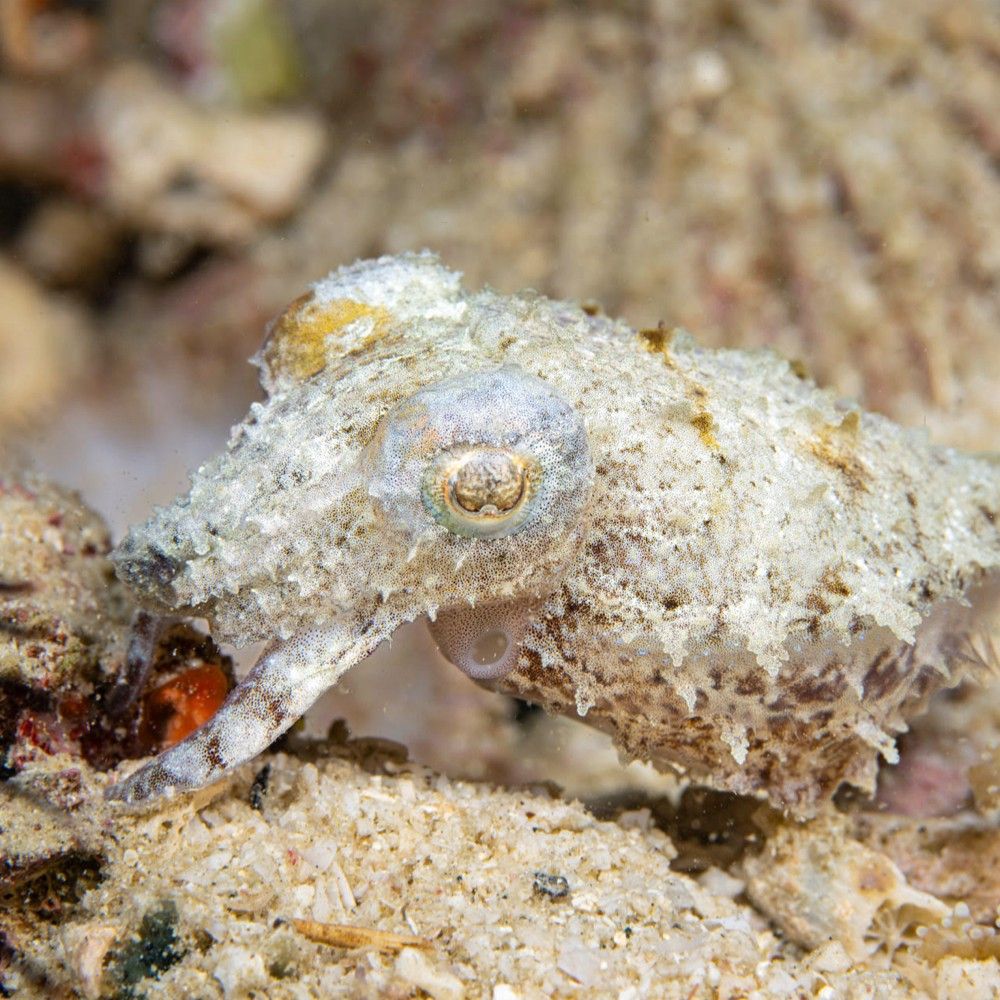
May 5, 2025 at 3:53 PM
The biology of cephalopod camouflage is just as intricate, bizarre, and enigma-riddled as you might hope. Super fascinating stuff in this one!
How are humans able to make sense of time? Not with special biology but with “time tools”—ideas, practices, and artifacts that render time more concrete.
My new paper explores this vast, varied toolkit—one that makes use of knots, nuts, hands, flowers, mountains, shadows, and much more.
(link 👇)
My new paper explores this vast, varied toolkit—one that makes use of knots, nuts, hands, flowers, mountains, shadows, and much more.
(link 👇)



May 2, 2025 at 4:51 PM
How are humans able to make sense of time? Not with special biology but with “time tools”—ideas, practices, and artifacts that render time more concrete.
My new paper explores this vast, varied toolkit—one that makes use of knots, nuts, hands, flowers, mountains, shadows, and much more.
(link 👇)
My new paper explores this vast, varied toolkit—one that makes use of knots, nuts, hands, flowers, mountains, shadows, and much more.
(link 👇)
Reposted by Kensy Cooperrider
Here's a very interesting read for the cognitive anthropologists out there. @kensycoop.bsky.social discusses the many ways by which humans have made sense of the passing of time. Humans being humans, there are many unexpectedly delightful solutions to the problem of time-keeping – such as knotting.

Time Tools
Humans understand time in a way no other animal does. This is not because of our evolved biology, however—it is because we have developed a diverse and powerful toolkit of ideas, practices, and artif....
onlinelibrary.wiley.com
May 2, 2025 at 10:43 AM
Here's a very interesting read for the cognitive anthropologists out there. @kensycoop.bsky.social discusses the many ways by which humans have made sense of the passing of time. Humans being humans, there are many unexpectedly delightful solutions to the problem of time-keeping – such as knotting.
Part of the "many" in 'Many Minds' is that we try to feature a wide breadth of disciplines. This is our first episode with a literary scholar—and a fun one!
New episode!! 📣📣
A conversation with Bradley Irish about the (alleged) universality of human emotions.
Are there "basic" emotions? Do our linguistic categories shape what we feel? Did people in Elizabethan London experience disgust the same way we do today?
Listen: disi.org/universal-em...
A conversation with Bradley Irish about the (alleged) universality of human emotions.
Are there "basic" emotions? Do our linguistic categories shape what we feel? Did people in Elizabethan London experience disgust the same way we do today?
Listen: disi.org/universal-em...

April 9, 2025 at 6:27 PM
Part of the "many" in 'Many Minds' is that we try to feature a wide breadth of disciplines. This is our first episode with a literary scholar—and a fun one!
Reposted by Kensy Cooperrider
Thanks to @kensycoop.bsky.social for this great interview about my book.
We cover domestication syndrome, plasticity-led evolution, soft inheritance, animal traditions, how culture shapes evolution, and more.
Kensy also does a wonderful production job, turning me into a coherent speaker! Thank you
We cover domestication syndrome, plasticity-led evolution, soft inheritance, animal traditions, how culture shapes evolution, and more.
Kensy also does a wonderful production job, turning me into a coherent speaker! Thank you
New episode!! 📣📣
A conversation w/ @kevinlala.bsky.social about his new (co-authored) book, ‘Evolution Evolving'!
Ideas about evolution have changed a lot in recent decades. An emerging view—synthesized by Lala et al.—puts developmental processes front and center.
Listen: disi.org/the-developm...
A conversation w/ @kevinlala.bsky.social about his new (co-authored) book, ‘Evolution Evolving'!
Ideas about evolution have changed a lot in recent decades. An emerging view—synthesized by Lala et al.—puts developmental processes front and center.
Listen: disi.org/the-developm...

February 25, 2025 at 3:43 PM
Thanks to @kensycoop.bsky.social for this great interview about my book.
We cover domestication syndrome, plasticity-led evolution, soft inheritance, animal traditions, how culture shapes evolution, and more.
Kensy also does a wonderful production job, turning me into a coherent speaker! Thank you
We cover domestication syndrome, plasticity-led evolution, soft inheritance, animal traditions, how culture shapes evolution, and more.
Kensy also does a wonderful production job, turning me into a coherent speaker! Thank you
Reposted by Kensy Cooperrider
The Many Minds podcast with the very sharp @kensycoop.bsky.social is one of my faves these days, and I especially love this episode with @tanialombrozo.bsky.social , which does a deep dive in how we learn not just by experience or exposure but also by thinking.
open.spotify.com/episode/1Clj...
open.spotify.com/episode/1Clj...

A paradox of learning
Many Minds · Episode
open.spotify.com
February 25, 2025 at 3:16 AM
The Many Minds podcast with the very sharp @kensycoop.bsky.social is one of my faves these days, and I especially love this episode with @tanialombrozo.bsky.social , which does a deep dive in how we learn not just by experience or exposure but also by thinking.
open.spotify.com/episode/1Clj...
open.spotify.com/episode/1Clj...
Really enjoyed this one!
In which we discuss:
- the prehistory of string
- why anthropology fell in—and out of—love with string figures
- Jacob's Ladder and other strikingly widespread figures
- knots galore
- topology as the first branch of math
- why the human mind is drawn to string figures
etc.
In which we discuss:
- the prehistory of string
- why anthropology fell in—and out of—love with string figures
- Jacob's Ladder and other strikingly widespread figures
- knots galore
- topology as the first branch of math
- why the human mind is drawn to string figures
etc.
New episode!! 🧵🎙️
A chat w/ @roope.bsky.social about string in human culture.
String is one of our most ancient and useful technologies. But we haven’t only used it for textiles, net-making, and other practical purposes. We’ve also long used it to tickle our minds.
Listen: disi.org/string-theor...
A chat w/ @roope.bsky.social about string in human culture.
String is one of our most ancient and useful technologies. But we haven’t only used it for textiles, net-making, and other practical purposes. We’ve also long used it to tickle our minds.
Listen: disi.org/string-theor...

February 10, 2025 at 5:23 PM
Really enjoyed this one!
In which we discuss:
- the prehistory of string
- why anthropology fell in—and out of—love with string figures
- Jacob's Ladder and other strikingly widespread figures
- knots galore
- topology as the first branch of math
- why the human mind is drawn to string figures
etc.
In which we discuss:
- the prehistory of string
- why anthropology fell in—and out of—love with string figures
- Jacob's Ladder and other strikingly widespread figures
- knots galore
- topology as the first branch of math
- why the human mind is drawn to string figures
etc.
Excited for my 7th DISI!
Happy—of course—to answer any questions if you're thinking of applying.
Happy—of course—to answer any questions if you're thinking of applying.
📣📣📣
Applications for the 2025 Diverse Intelligences Summer Institute (DISI) are now open!!
Are you interested in intelligence, mind, and cognition in all its forms? Early-career scholars from any discipline—and storytellers in any medium—are encouraged to apply!
More info: disi.org
Applications for the 2025 Diverse Intelligences Summer Institute (DISI) are now open!!
Are you interested in intelligence, mind, and cognition in all its forms? Early-career scholars from any discipline—and storytellers in any medium—are encouraged to apply!
More info: disi.org
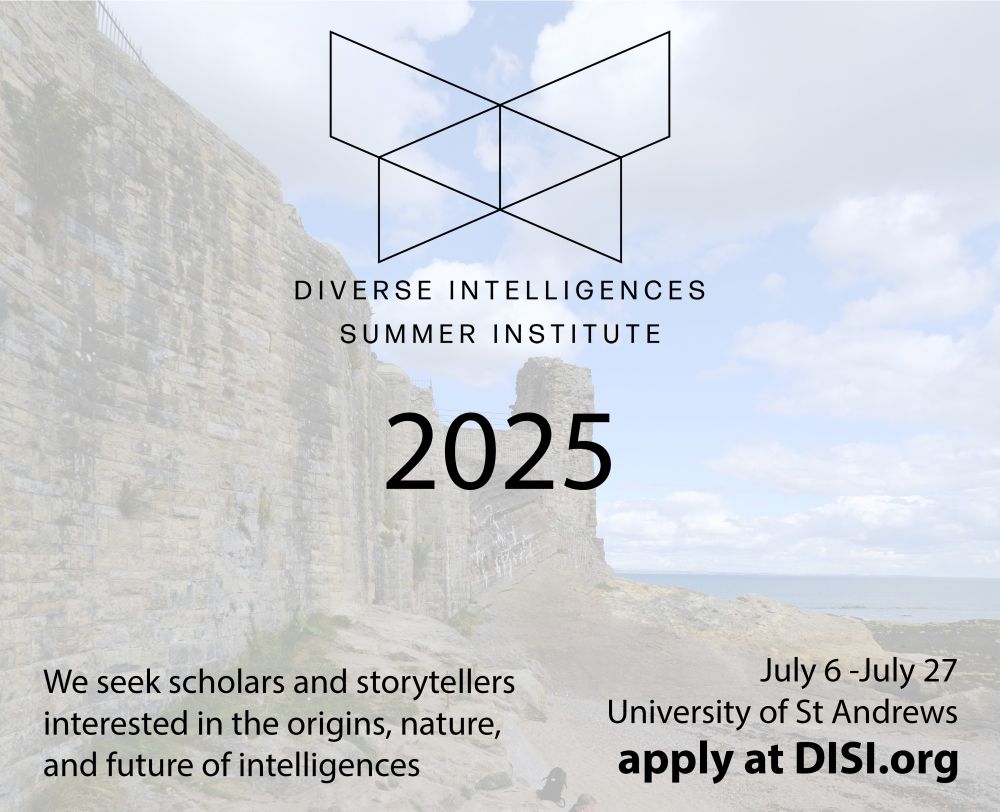
January 24, 2025 at 5:35 PM
Excited for my 7th DISI!
Happy—of course—to answer any questions if you're thinking of applying.
Happy—of course—to answer any questions if you're thinking of applying.
Enjoyed this one!
In which we discuss:
- the curse of knowledge & illusion of explanatory depth
- why chain-of-thought prompting works (or doesn't)
- "Explain Like I'm Five"
- the Tower of Pisa thought experiment
- representational re-description
- learning by writing, talking, & presenting
- etc.!
In which we discuss:
- the curse of knowledge & illusion of explanatory depth
- why chain-of-thought prompting works (or doesn't)
- "Explain Like I'm Five"
- the Tower of Pisa thought experiment
- representational re-description
- learning by writing, talking, & presenting
- etc.!
New episode!! 🎙️🎙️
A conversation w/ @tanialombrozo.bsky.social about "learning by thinking."
We often learn from others or from the outside world. But other times new understanding bubbles up from inside our own minds. When does this happen? And how does it work?
Listen: disi.org/a-paradox-of...
A conversation w/ @tanialombrozo.bsky.social about "learning by thinking."
We often learn from others or from the outside world. But other times new understanding bubbles up from inside our own minds. When does this happen? And how does it work?
Listen: disi.org/a-paradox-of...

January 15, 2025 at 7:43 PM
Enjoyed this one!
In which we discuss:
- the curse of knowledge & illusion of explanatory depth
- why chain-of-thought prompting works (or doesn't)
- "Explain Like I'm Five"
- the Tower of Pisa thought experiment
- representational re-description
- learning by writing, talking, & presenting
- etc.!
In which we discuss:
- the curse of knowledge & illusion of explanatory depth
- why chain-of-thought prompting works (or doesn't)
- "Explain Like I'm Five"
- the Tower of Pisa thought experiment
- representational re-description
- learning by writing, talking, & presenting
- etc.!
Naturally, I love all our episodes equally. But these 5 are great!
Thanks for a great 2024, friends!
We put out 21 new episodes this year (19 interviews, 2 essays). The top 5 were...
(in chronological order)
🧵
We put out 21 new episodes this year (19 interviews, 2 essays). The top 5 were...
(in chronological order)
🧵
December 30, 2024 at 8:08 PM
Naturally, I love all our episodes equally. But these 5 are great!

